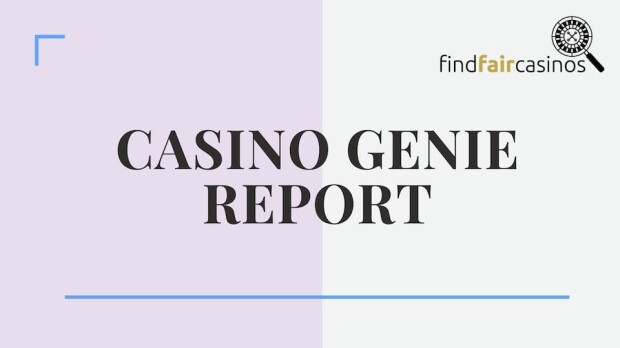
Casino Genie Report
Introduction
This report is a Casino Genie Report with focus on the US market. The iGaming industry is ongoing wild change currently as many regions across the world are re-evaluating their stance on gambling activities. This creates an enormous opportunity for all players involved in iGaming. There are numerous emerging markets around the world, but most will agree that the US market looks set to be one of the most profitable around.
However, the US iGaming scene is complex and will offer many challenges to those looking to get involved. For example, not all states have legalised the activity, causing many gambling sites to receive out-of-state players. To navigate this complex landscape, analysing the available data will prove instrumental in identifying the trends and patterns that can be seen and used to great effect by industry players.
This report will focus on the changing gambling laws around the US as this is the first barrier that most operators, affiliates and various other players will face when looking to move into new territory. Also, the report will look at how the US public has reacted to these changes to legislation, as well as in what ways people gambled before these laws came into effect.
Demographic Data
The main content of this report will revolve around demographic data, taken from a survey of 5 states: Georgia, Florida, Ohio, California, and Texas. These states are useful to examine as the legality of gambling is different across the range. This means more rounded data samples were able to be collected from the survey, as opposed to one-sided gatherings.
The most useful findings can come by examining the results through a plethora of lenses: age, gender, location, political alignment, bordering states, legislation, and tribal gambling. By focusing on the data through these lenses, a greater range of patterns will be able to be identified, therefore leading to more conclusions on the data set.
Age
Patterns and trends in age datasets are useful as they can help identify a target audience. By understanding the thinking and behaviour of people in a certain age group, industry players are better able to devise strategies around those findings.
In Georgia, 11.34% of surveyed people aged 25-34 regularly crossed state lines to take part in betting or gambling. In addition to this, 22.67% of people did so occasionally, while the rest had never done so at all. As already stated, in the US, some states have legalised gambling and some haven’t. Georgia is one of those states where most of those activities are prohibited, so it is clear to see why some players would want to cross state line to gamble legally.

The next age group, 35-44, mirrors approximately the same split as before. 11% of surveyed people regularly crossed state lines to gamble and 14.66% did so on occasion. This would indicate that younger players are more eager to gamble, seeing as how they will go to an entirely different state to access gambling activities.
When looking at the other age groups, which are 45-54 and 65+, the same pattern holds regarding whether people have crossed state lines to gamble or not. However, as the participants’ age gets older, the weight of those responses decreases. This reinforces the idea that more young people are crossing state lines to gamble, and also suggests that more young people enjoy gambling than older people.
When the same data is looked at from the other states, interesting differences occur. For example, one might expect the results to be similar for the 18-24 age bracket in Florida. However, all surveyed people within this age group stated that they have never crossed state line to partake in betting or gambling. The same is true for the 25-34 age range too, and people who have crossed state lines only start to appear when the age range is increased to 35-44. This shift from the responses that were seen in Georgia may make sense when considering the current legal climate regarding gambling in the neighbouring states of Florida. In Alabama, Georgia and South Carolina, there is pending legislation on gambling laws which means that people are less likely to cross those lines, as it wouldn’t be worth it.
In addition to whether people have crossed state lines or not, people were also asked whether they had accessed an online betting or gambling site for another state where online gambling is legal. This differs from the last question on the survey in that people’s views towards online gambling were being examined. One would assume that the younger age brackets are more liable to view online gambling positively considering that older people are typically less up to date with technology. However, in Ohio, only 13.58% of people aged 25-34 used an out of state gambling site and this was only occasionally too. This lowers to a minuscule 3.51% when looking at the 35-44 age range.
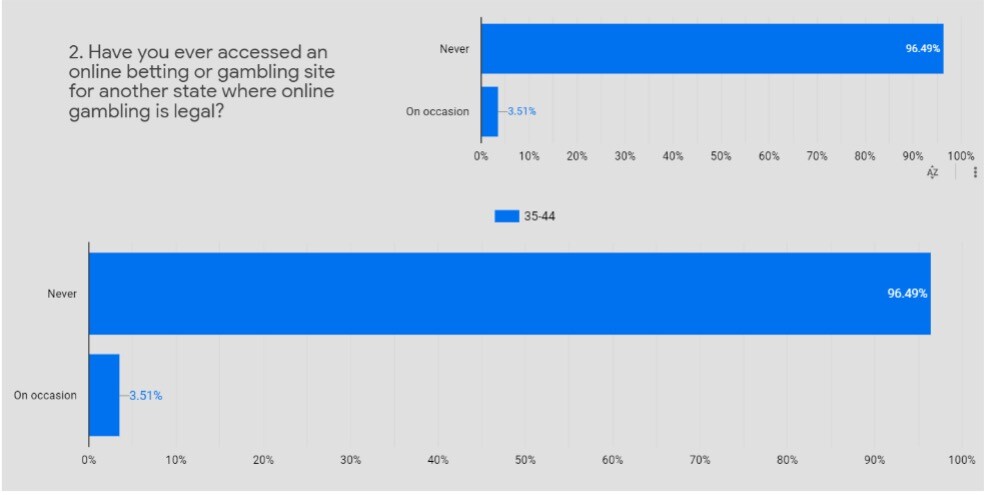
Interestingly, the 45-54 age range shows that more people in this bracket accessed these sites than the previous, which comes to a total of 7.47%. As the age bracket expands even more to include 55-64, 3.14% of surveyed people said that they regularly access out of state gambling sites and 10.57% said that they did so occasionally.
This suggests that while the majority of online gamblers are younger people, there are still many older people that enjoy online gambling. There is also an argument to be made that some older people like to gamble more; 3.14% of people aged 55-64 in Ohio said that they use out of state gambling sites regularly, but 13.58% of those aged 25-34 said they accessed the same sites only on occasion.
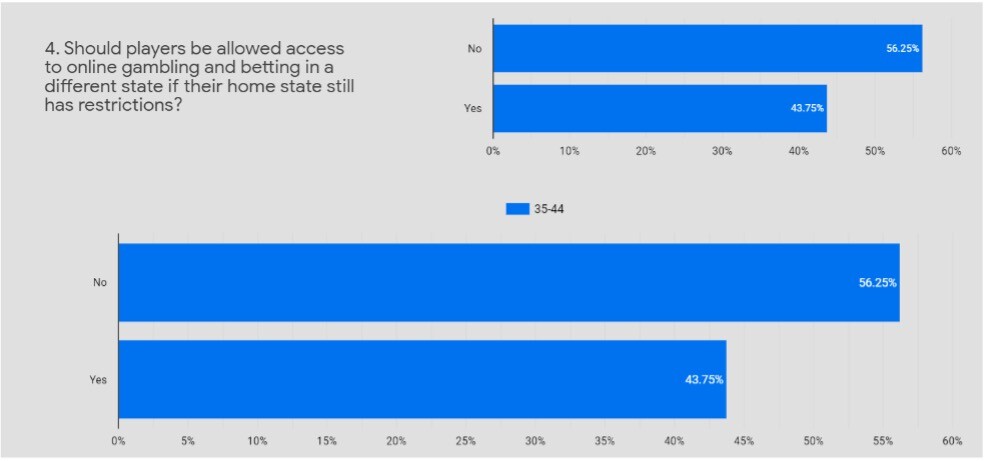
Another question on the survey focused on identifying people’s views towards the current legislation in their own states, and whether players would be allowed to access gambling sites in different states where the activity is legal. In California, out of those aged 18-24, 17.25% believed that players should be able to access online gambling sites in a different state if their home state has restrictions. On its own, this figure wouldn’t mean much, but by comparing it to the responses from the other age ranges, an interesting conclusion can be made. 41.52% of people aged 25-34 believed also agreed that players should be able to play on out of state sites regardless of restrictions. The number of people who also replied ‘yes’ increased to 43.75% when looking at the 35-44 age range, and a near equal 50.74% when examining the 45-54 bracket.
This would indicate that older people view legislative change more positively than younger people. California is currently a state that prohibits many gambling activities but is pending legislation at the moment. On the other hand, this does not suggest why younger people might be more opposed to more lenient gambling laws coming into effect. However, looking at another state such as Texas may be instrumental in deciding whether the result found in California is anomalous.
In Texas, 59.89% of people aged 18-24 believed that players should be allowed access to online gambling and betting sites regardless of home state restrictions. This directly contends with the previous figure that was found in California and is much more in keeping with what is expected from the younger demographic. Given that the state of gambling in Texas is similar to what it is in California, there are also no biases to skew the results. The same response can be found looking at the 25-34 bracket as 58.8% of people also said ‘yes’. The figures decrease then increase again when looking at the next two ages brackets of 35-44 and 45-54. This is more of a varied response when compared to what Californians responded with. From this, it can be said that differing views on gambling laws are not necessarily governed by age, but by state.
Wrap-Up
The common view regarding age and gambling is that younger people are more liberal on the activity. This is likely because of the better grasp more recent generations have with technology. However, the results from this survey show that this view is not necessarily true as it is clear that older people enjoy gambling too. As the data shows, older people in Florida crosses state lines to gamble more than younger people, showing that the interest is still there in the upper age brackets.
Gender
When it comes to gambling, there is no doubt what gender prefers to engage in the activity. However, gambling is increasing throughout the world and with that, more females are starting to get involved in gambling. Determining the habits and views of each gender might be useful to those who are looking at how best to appeal to their target audience.
Looking at the results in Georgia, the data seems to follow what is expected. When asked if they have ever crossed state lines to take part in gambling, 25.59% of males responded that they do so on occasion whereas 8.84% of males do so regularly. This is compared with 4.61% of females who cross state lines occasionally to gamble and 2.43% who do this activity regularly. As it is already known that there are more male gamblers than female gamblers, this result is unsurprising.
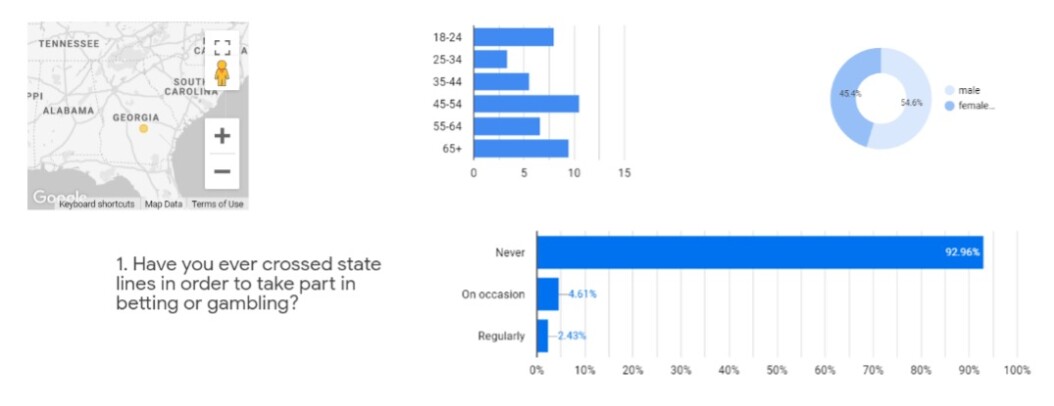
However, it would seem that the number of females who enjoy gambling varies by state. Instead of mirroring the results seen in Georgia, more females cross state lines to gamble in Florida, as can be seen by the 11.05% of females who said that they do so occasionally. Of course, this may make sense when the current legality of gambling is considered in Florida. At the moment, the state is taking no action on its current gambling laws, which are already restrictive. This means that Floridians are more likely to cross state lines to gamble. In contrast, Georgians might be aware that their state is pending legislation regarding gambling, so it makes sense that females will be crossing state lines in Georgia.
Although traditional gambling is a loved activity, there is no doubt that more people are making the switch to the online platform. In Ohio, 9.95% of males said that they occasionally accessed an online betting or gambling site in another state where gambling is legal. A smaller 1.19% of males said they did the same regularly. The same story in Georgia and Florida is apparent in Ohio. This is because only 3.96% of females admitted that they access these sites occasionally, with zero responses for females who might have engaged in the activity regularly.
While the same pattern holds regarding most of the states, Texas seems to be an exception. Here, 4.52% of males accessed out of state gambling sites occasionally and 3.59% did this regularly. On the other hand, the number of females who accessed these sites was much higher in Texas as they account for 24.22% of the ‘occasionally’ response and 3.53% of the ‘regularly’ response. As it is normally understood that males gamble more than females, these findings are interesting. However, the fact that only Texas illustrates this trend might indicate that this is an anomalous result. Across the other four states in the survey, it is clear that males are more willing to cross state lines to gamble or access out of state gambling sites. Given that this is not true only in Texas, it suggests that for the most part, males are still the ones who view gambling more positively.
It might also be useful to consider the split of the overall respondents as this will help inform how many males and females are interested in gambling in the five states. For the most part, the percentage split is around 50/50 leaning in favour of males. However, each state has this split leaning towards males to varying amounts, which could inform how much each gender prefers gambling in these states.
It should first be stated that the findings of this survey have shed new light on the gambling habits of males and females. As already stated, the common belief was that males gamble more frequently than females, and while this is still true, the fact that the percentage split is close to 50/50 would indicate that more females enjoy gambling than most might think. In Georgia, 54.6% of males responded to the survey compared to 45.4% of females, giving a differential of 4.6%. Similarly, in Florida, 54.3% of males responded in contrast to 45.7% of females, giving a percentage differential of 5.7%. It makes sense why there are more male and female gamblers in Florida – the state is currently taking no action regarding gambling legislation. Naturally, this creates a desire and a demand for the activity.
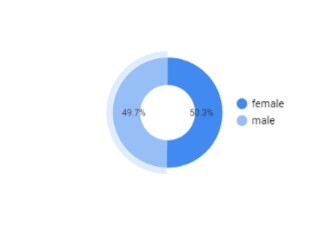
On the other hand, the split in Ohio is much more interesting. Out of all those who responded to the survey, 50.3% were male and 49.7% were female, giving only a 0.3% differential. The fact that this is almost 50/50 shows that in Ohio, females enjoy gambling almost as much as males do, which is in direct contrast to the previous two states. On the one hand, this might seem surprising considering that Ohio is one state that is currently pending legislation when it comes to legal gambling. However, Ohio is bordered by Pennsylvania, and West Virginia. These are both states where gambling is legal. This means that residents of Ohio have easy access to gambling across the border. This is also reinforced by the fact that out of the five states surveyed, Ohio is second only to Texas when it comes to the percentage of people who have crossed state lines to gamble.
The California gender split is weighted 54.1% towards males and 45.9% for females. This creates a percentage differential of 4.1% and mirrors what has previously been seen in Florida and Georgia. The fact that these are all states that have not yet taken action on gambling laws or are in the midst of doing so is no coincidence. Looking at the data, it is clear that these states have a greater split of males and females when it comes to interest in gambling. Ohio seems to be the exception to this rule, but it can be argued that this is because, along with California, Ohio has the greatest number of neighbouring states out of the five surveyed where gambling is legal. Texas also has a smaller differential at 1.3%, which is more similar to what was found in Ohio. However, this may be because of the massive size of the state, as well as the fact that it is bordered by two states where gambling is legal.
Wrap-Up
The common view regarding gender and gambling is that males enjoy it more and engage in the activity more frequently. As the split is always weighted in favour of males, this makes sense. However, the survey has helped reveal female gambling habits more and has illustrated that the split between males and females when it comes to gambling is smaller than most might think.
Location
In the US especially, location is a massive factor when it comes to gambling as it is up to each state’s discretion whether the activity is legal or not. This means that some states in America have legalised the activity, but it is possible to find some neighbouring states where gambling is still prohibited. However, the fact that there are still states that haven’t legalised gambling signals an opportunity for all those involved in iGaming. By looking at the survey results by location, it should be easier to get a good understanding of the public’s sentiment towards gambling change.
Those who live in states where gambling is restricted face a problem if these people enjoy gambling. This is why they choose to circumvent these laws by accessing out of state casinos and other forms of gambling, whether that be online or through more traditional means. In this way, it is easy to get an understanding of the public’s sentiment towards gambling in the surveyed states by looking at what percentage of people did this.
In Georgia, 77.99% of people surveyed didn’t cross state lines to access gambling activities. Given that this is a high number, it can be said that many Georgians aren’t too concerned when it comes to gambling.
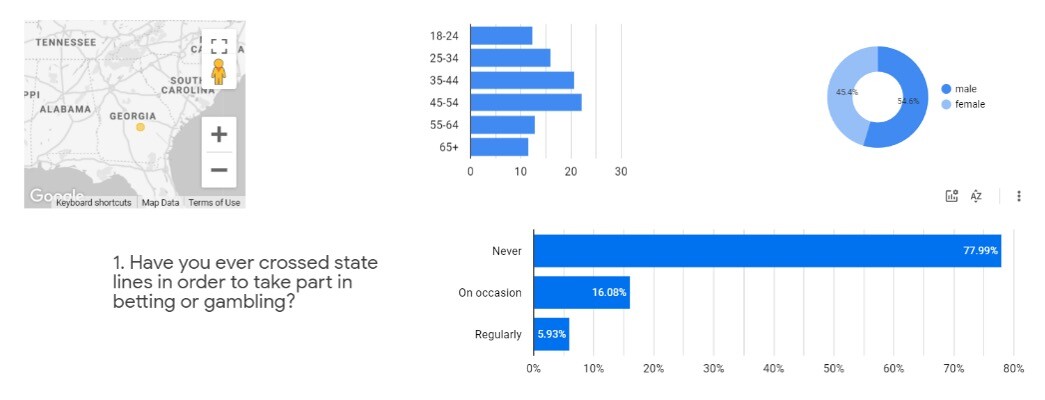
However, the fact that the state is currently pending legislation contradicts this finding, as it could be expected that any state that is considering changing its gambling laws is doing so because the desire and the demand for it is there. This is a line of thinking that can be accurately applied to Florida, where a massive 85.64% of surveyed people also said that they had never crossed state lines for the purpose of gambling. Given that no action is currently being taken by the state regarding gambling laws though, this is one figure that makes sense.
Ohio and California show very similar results, as 73.88% and 73.09% of people said that they have never crossed state lines to gamble. As these are two states that are pending legislation regarding gambling, they are similar to Georgia’s case in that the public sentiment seems to be that people are not concerned whether they can gamble or not. On the other hand, one might interpret this another way. The fact that Georgia and Ohio are both pending legislation might indicate that the public would rather wait until the gambling laws in their home state change instead of travelling to another state just to play.
Texas tells a much different story when it comes to the public’s opinions on changes in gambling laws. This is because only 46.42% of people said that they had never crossed state lines to gamble. Looking at the other side of the equation, this means that 53.58% of people had either done so occasionally or regularly. This represents over half of all people surveyed and this finding is a far cry away from the public sentiment displayed in other states. It is clear that most Texans welcome changes to gambling legislation, and as the state is currently pending legislation, residents may indeed get exactly what they are after.
For a more focused view on each state’s sentiment towards changing gambling laws, the fourth question of the survey is a useful metric to use. Here, participants were asked whether players should be allowed access to online gambling and betting in a different state if their home state still had restrictions. As this was a yes or no question, the public’s attitude in the five surveyed states is easy to extrapolate from the data.
In Georgia, 57% of people replied yes, people should be able to access gambling activities if their home state has restrictive gambling laws. This contrasts with the fact that the majority of people in Georgia said that they hadn’t crossed state lines, but this makes sense as the fourth question in the survey refers to online gambling. This activity has risen in popularity in recent years, and many people are more willing to stay at home and gamble at out of state gambling sites rather than physically travel and cross state lines. This might also explain why a higher 62.33% of Texans also thought that players should be able to access out of state casinos if their home state still has restrictions.

Conversely, only 23.67% of Floridians said that players should be able to gamble at out of state gambling sites if their home state has restrictions on the activity. This figure directly contrasts with what can be seen in Georgia, but this may be because there is no current action being taken concerning gambling in Florida. However, in places such as Georgia, Ohio, Texas and California, there is legislation pending. This might suggest why so many Floridians think that people shouldn’t be able to access out of state gambling sites.
One might assume that Florida might be the exception when reviewing the survey data, but it would seem that Ohio and California follow along the same lines. In Ohio, 39.3% of people agreed that players should be allowed to gamble at out of state gambling sites regardless of home state restrictions. While this is a higher figure than what can be seen from Florida, it is still unexpected considering that the state is currently pending gambling legislation. The same is true for California, where even fewer people, 30.2%, thought the same. These results could be explained by the fact that these are states that are expected to receive changes in gambling laws eventually, which might explain why the majority of residents feel like there is no need for players to access out of state gambling sites. Despite this, it is clear to see that the majority of the five surveyed states do not believe players who live in gambling restricted areas should access out of state gambling sites.
Wrap-Up
Looking at the data through the lens of locations has enabled conclusions to be drawn regarding those states’ views on changing gambling laws. For the most part, these are places where gambling legislation is still pending, so one would assume that most people would view this positively. However, the data tells a different story and only two out of the five surveyed states, Texas and Georgia, seem to have a positive view on changing gambling laws. The rest of the states appear to have a more negative view on gambling legislative change, as can be seen by the high percentages of people who disagreed with playing at out of state gambling sites.
Red vs Blue
In America, politics is split between two parties, Democrats and Republicans. This means that states will either be red or blue respectively, given their political stance. As red and blue states can be expected to have differing opinions on certain topics, it might be interesting to examine how this might influence the responses gained from the survey. Whilst these red and blue states do not really have any clear approach to gambling, the survey might reveal which party favours the activity more.
First up is Georgia, a blue state. However, the state is in a unique position considering it is entirely bordered by other red states. When asked if they had ever accessed an online betting or gambling site located in another country outside of the US, 87.93% of Georgians said that they never had. This would suggest that the gambling sentiment in Georgia is low, seeing as such an overwhelming percentage of people did not access gambling sites that weren’t located in the US. On the other hand, the same group of people were also asked if players should be allowed to access online gambling sites in a different state if their homes state still has restrictions.
In this case, 57.12% of people said yes. Given this, it would seem that in Georgia, people are more likely to access US-based gambling sites rather than international ones. Through this lens, it can be said that Georgia has a moderate approach towards gambling.
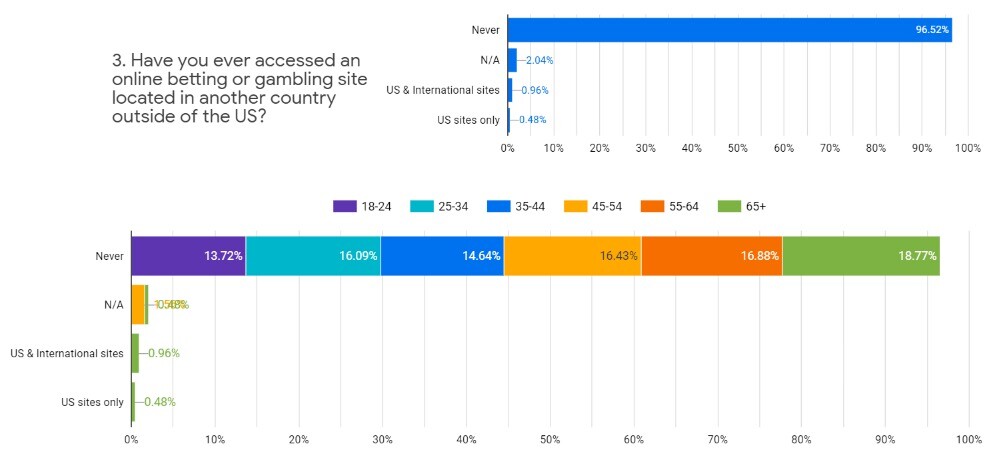
Florida is right next to Georgia but is a red state. This difference might make the survey’s findings more interesting, as a greater number of people stated that they never had accessed online gambling sites outside of the US, totalling 96.52%. This is much higher than what can be found in Georgia, and this would indicate that more people view gambling in a negative light in Florida. This could either be because no action is currently being taken on gambling legislation within the state, or the fact that it is a Democrat state. When people were asked the fourth question on the survey, only 23.67% of respondents said that people should be allowed to circumvent restrictions and gamble at out of state sites. This is a massive decrease from the Georgia findings and suggests that red states have a stricter view on gambling activities. To find out if this is a trend or not, the findings from the other three states will be instrumental in coming to a conclusion.
Ohio is another red state, which is bordered by two blue states. Judging by previous data, one can expect that the general feeling towards gambling in Ohio will be negative instead of positive. When asked if they had ever used a betting or gambling site located in another country, 88.2% of people responded that they never had. Seeing as how this is a slightly higher figure than what was seen in Georgia, it can be said that Ohio is more opposed to gambling as it is a red state. The same finding is apparent when looking at the data retrieved from the fourth question. When asked if people should be able to access online gambling sites in a different state if their home state still had restrictions, 39.3% of people agreed. Again, this is lower than the Georgia results and more closely follow what was seen in Florida, another red state.
When it comes to California, a blue state, more of the same can be seen. The survey reveals that 88.95% of people had never accessed an online betting or gambling site in a country other than the US before. While this closely mirrors the data that was found in Georgia, it is interesting to see that more people in Ohio responded the same, despite being a red state. However, this might be explained due to California’s greater size, which allows for a greater selection of people that will have differing views on gambling. In addition, California is also bordered by two states where many gambling activities are legal, which may sway the public’s opinion in favour of gambling. The same reasoning could explain why 38.6% of people said that players should be able to access gambling sites located in a different state due to home state restrictions.
Texas is a red state, so it would follow that the findings from the state will lead to a conclusion that gambling is viewed negatively by the general public. Interestingly, out of all 5 states, Texas has the least amount of people who said that they had never accessed a gambling or betting site located in another country outside of the US, coming to a total of 83.72%. This would indicate that Texans enjoy gambling despite being a red state. This is corroborated by the findings from the fourth question of the survey. An impressive 52.97% of people thought that players should be able to gamble on online sites if their home state has restrictions. This is a result that is more in line with what could be found in Georgia, and it may illustrate that political alignment doesn’t really affect the gambling attitudes of those in that state.
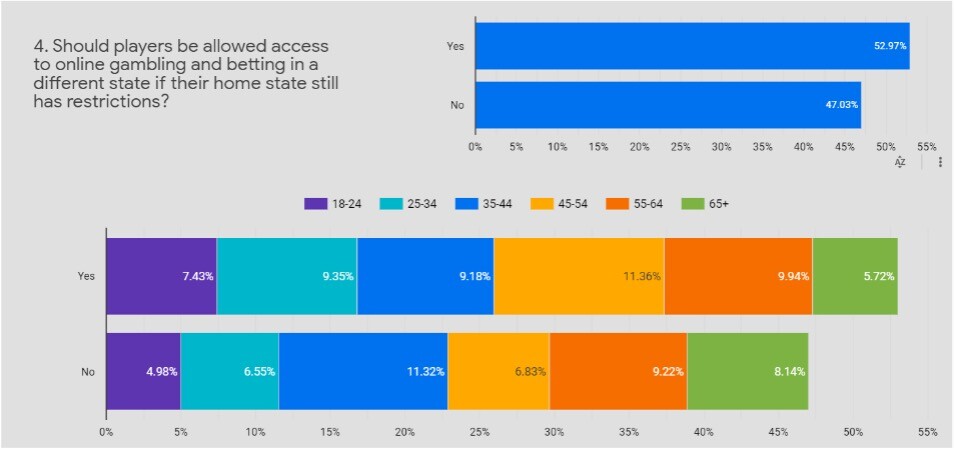
Wrap-Up
Looking at the survey through the lens of political alignment is useful as it could reveal which party and what states are more in favour of gambling. Initially, a pattern seemed to be developing that suggested that red states were less in favour of gambling whereas blue states viewed the activity more positively. However, the results from Texas shows that political alignment does not matter as the results mirrored what could be found in Georgia, a blue state. There is still a case to be made though; out of the top 5 states on Google Trends that ranked for the search term ‘online casinos’, three of them were blue states.
Border States
As has already been suggested in this report, it would appear that border states can affect the gambling laws of neighbouring states, as well as the attitudes that those neighbouring states hold on the activity. Naturally, if a bordering state changes its stance on gambling through legislation, this process will likely prompt its neighbours to consider doing the same thing or at least raise the discussion. Given this, it is useful to see if there is an identifiable correlation between the surveyed states rules on gambling and their surrounding states.
When it comes to Georgia, the state is currently pending gambling legislation. It is not a coincidence to see that two states that border Georgia, Alabama and South Carolina, are also pending legislation. However, Georgia is also bordered by another two states that have already legalised some gambling activities and are awaiting the launch of a regulated gambling industry. These states are Tennessee and North Carolina. The presence of these two states would suggest that Georgia has been influenced into reviewing its gambling laws too, given the presence of two states that have already made legislative changes and another two that are currently changing. As already stated, 57.12% of people in Georgia believe that players should be able to access online gambling sites in different states, reinforcing the idea that the state has been influenced by the decisions of its neighbours.
Florida is an interesting case as it is the only state surveyed that is currently taking no action when it comes to gambling. As Florida is a state that geographically juts out from the mainland, it is only bordered by two other states, Alabama and Georgia. These are two states that are currently pending legislation when it comes to gambling, which might explain why Florida is taking no action at the moment. Floridians as of yet have not had easy access to the gambling scene, unlike Alabama and Georgia which are bordered by states where the activity is legal. This lack of exposure to gambling has likely made it so that those in Florida don’t have a wholly positive view of it and this is shown by the fact that a small 23.67% of people in Florida agree that players should be able to access out of state casinos if their home state still has restrictions.
Ohio is similar to Georgia in that it is also pending legislation. Another similarity can be found with Ohio’s bordering states too. To the west, Ohio is bordered by Indiana which has legalised gambling but the industry is pending launch. To the north and south, Ohio is bordered by Kentucky and Michigan respectively which are both states that are also pending gambling legislation. However, it is interesting to look to the east, where Ohio is bordered by West Virginia and Pennsylvania. These are two states where most gambling activities are fully legal and can be accessed by residents at will. Given this kind of exposure to gambling, it follows why Ohio is currently pending legislation. The easy access the state has to gambling is the main indicator of this and explains why 23.54% of people in Ohio admitted that they occasionally crossed state lines to gamble.

California is on the West Coast of America and as such, is only bordered by three states. California itself is pending legislation at the moment, as is Arizona, which is neighbours with the Golden State. Its remaining two bordering states, Nevada and Oregon, have fully legalised gambling activities and the industry has already launched, allowing residents of those states to engage in traditional and online gambling. Again, the fact that Californians have received so much exposure to gambling already is likely a key reason why discussions have been raised over gambling laws in the region. The presence of two neighbouring states that have legalised the activity is likely to sway most Californians in favour of the activity and this can be seen by the number of residents who chose to occasionally cross state lines to gamble, which comes to 21.93%.
Texas is one of the biggest states in America, so it makes sense why it is bordered by so many different states. These are New Mexico, Oklahoma, Arkansas and Louisiana. Texas is also pending gambling legalisation and so are two of its bordering states, Louisiana and Oklahoma. This might have already been enough to get discussions going in Texas regarding changes to gambling laws, but the state is also neighbours to New Mexico and Arkansas, two states where many gambling activities are fully legal.
Just like the other states in the survey, it would seem that the decisions of bordering states have influenced Texas into reviewing its own gambling laws as they are currently pending legislation. It can also be said that the general view of gambling in Texas is positive; 32.75% of Texans admitted to occasionally crossing state lines to gamble and 52.97% of Texans thought that players should be allowed access to out of state online gambling sites if their home state still has restrictions.
Wrap-Up
From the data, it is clear to see that most of the surveyed states have been influenced in some way due to the legality of gambling in bordering states. The only exception to this rule is Florida, but equally, this is the only state out of the five that is not bordered with at least one state that has either legalised gambling and is pending the launch of the industry or has outright launched it completely. There is no doubt that the decisions that some states make influence what others might do, which could prove to be a useful conclusion for those involved in the iGaming industry as this will help players decide where the next opportunity might arise.
Current Legislation Status
At the moment, America is undergoing sweeping change when it comes to gambling laws. The content of this report should have already made it clear that many different states are in different stages of legalisation, and the reality is that the legality of gambling differs enormously depending on which state is examined. Of course, iGaming players will want to know what the current legislation status of these different states are as this will help them devise strategies when entering the scene.
In Georgia, most gambling activities are restricted, which include online casinos, online poker and sports betting. This is not to say that there is not a demand for change in the region though. Google Trends data show that Georgia is ranked 19th for the ‘online casino’ term, showing that people certainly want to start playing as soon as possible. However, the state has not yet made gambling legal, and those who want to play in the region are limited to other activities such as social casinos or the state-run lottery. Though these have a name that would indicate gambling, social casinos are more sweepstakes than they are gambling. Georgia is one of the strictest states when it comes to gambling, which is why it is unsurprising to see that the many bills have failed in the past. On the other hand, in June 2020, House Bill 93 passed on a Senate Special Judiciary Committee vote. This is a bill that would legalise sports wagering and online sports betting, which signals progress for the state. Before being made law, it still needs to go through the Senate, but there is no doubt that Georgia is at least undergoing gambling change compared to states like Florida.
Similarly to Georgia, Floridians can access some activities that resemble gambling, such as the aforementioned social casinos. However, when it comes to real casino play, there is no doubt that the activity is still illegal in the Sunshine State. Florida has been very resistant when it comes to legalising online casinos, even though other East Coast states such as New Jersey have had long-standing gambling laws that allow their residents to play at online casinos. Sports betting is also currently illegal, though this could change in the near future. In 2021, a compact with the Seminole Tribe established that the tribe will be able to offer sports betting to its customers who travel to their land-based casinos. In return, the Seminole Tribe will play a portion of gaming revenue over 30 years. Those who enjoy sports betting can get excited by this news, but only time will tell if online casinos will be legalised as an extension of this compact.
Ohio differs from the previous two states in that some forms of online gambling are already legal in the state, though it isn’t what most veteran players would expect. These activities include horse betting and fantasy sports, but do not include the more traditional online gambling methods such as casinos, poker, and sports betting. However, on the sports betting front, significant progress is being made. Ohio legislators were able to pass a bill that would introduce sports betting to the state, and it was officially signed into law by Governor Mike DeWine in December 2021. This is an important step forward for the state and although it will still be a while until Ohioans can place sports bets, the introduction of sports betting means that players can also look forward to online casinos discussions taking place in the future.
Much like the other surveyed states, most forms of online gambling, including poker, casinos and sports betting, are not legal in California. While residents can still access the usual social casinos that are commonplace in many states across the US, real gambling activities are hard to come by in the Golden State. Daily fantasy sports offerings are also available to Californians, as well as several horse tracks for online pari-mutuel wagering. The recent history of gambling legislation in the state is not very promising as proposed changes seem to fade into obscurity. This is because tribal casinos and lawmakers have different priorities and getting anything concrete regarding online casinos has proven to be difficult. However, the sports betting front looks promising after the 2018 U.S Supreme Court decision to allow states to legalise sports betting.
The situation in Texas looks to be one of the bleakest out of the surveyed states, and this is because of the state’s outlook on all forms of gambling. Currently, players can't engage in many gambling activities, which include casino games, sports betting and online poker. The state also harbours a few tribal casinos run by two Native American tribes, but even these have faced many legal challenges by the Texas government. In addition to these casinos, some people also take cruises into international waters to gamble, which head out from the Gulf Coast. Social casinos are also present, but when it comes to seeing real legislative change, the state has run into many dead ends. This can be seen through the 2019 sports betting proposal from Representative Eddie Lucio III, which did not go anywhere. However, failed proposals are better than no proposals at all, and anything can happen following the Supreme Court’s 2018 decision to let individual states allow legal sports betting.
Wrap-Up
It is clear that the situation in America is one that iGaming players will find difficult to navigate. Just because one state has legalised gambling activities, it does not necessarily mean that bordering states have done or are looking to do the same. The potential for the industry was given new life following the Supreme Court’s 2018 decision to allow states to decide if they want to legalise sports betting or not. This has allowed discussions surrounding gambling to increase and has paved the way for many states in America to change their stance on the activity. Although there are some states like Texas and Florida that have proven to be slow to join the party, the evidence would indicate that the majority of the US is only heading one way when it comes to gambling.
Presence of Tribal Gambling Rights
Most will be aware that some states in the US are home to certain tribes, Native Americans who often have exclusive casino gambling rights in the states in which they are present. In many parts of America, this is the only way that people can play at casinos legally and most land-based casinos will usually be tribe-owned. Whether this is a positive or a negative thing is a matter of debate, but the data from the survey should help reveal general attitudes towards tribal gambling rights in the five examined states.

In Georgia, there are no land-based casinos to speak of, which means that the tribes that may be present there do not have a claim to the gambling industry. In fact, most of Georgia’s gambling activities are only present in the online space, and this fact could influence how the state views tribal gambling rights. When asked if they support the launch of online betting and gambling supported by tribal casino owners, 60.08% of Georgians said that they did. This might be an interesting figure to consider as there are no tribal casinos already present in the region, so it is useful to consider why so many people might have agreed with the notion. However, the absence of these establishments might actually explain why most Georgians would agree with their launch as it is clear that there is a desire for gambling in the state. People were also asked whether they thought it was right for gambling services to launch that ignore tribal casino rights, and 75.64% of Georgians said no, clearly showing their support for Native American tribes.
In Florida, the findings are drastically different. When asked if they supported the launch of online betting and gambling supported by tribal casino owners, 74.47% of participants said no. This result is an interesting one considering that there is already a tribe in Florida that offers several casinos that residents can go to.
The Seminole Tribe has enjoyed a long influence in Florida and owns several casinos in the state, so it is difficult to see why Floridians do not back the launch of online betting and gambling that is supported by tribal casino owners. This may be due to the lack of action regarding gambling law that is commonplace in the state, which would indicate that Florida isn’t in favour of gambling. However, just like what was seen in Georgia, 82.02% of Floridians also do not support the launch of gambling services that avoid tribal casino rights. This figure would suggest that although Florida might be opposed to the idea of more tribe-run gambling services, they understand the need for Native American tribes to have access to such deals.

The results from the Ohio survey are much more interesting. This is because the split from the fifth question on the survey is much closer compared to the other two states. When asked if the launch of online betting and gambling supplemented by tribal casino owners was supported, only 45.46% of people said yes. This would indicate that Ohio is another state that is not fond of the idea of online gambling services being run by Native American tribes. This is interesting considering the mindset of some states that are closely west of Ohio, such as New York state. In the past, New York state has changed the language of some terms to avoid issues with tribal rights, clearly showing the state’s support of these tribes. However, in Ohio, the same pattern seen from the other two states can be seen from the last question on the survey. It still stands that most Ohioans would prefer that online betting and gambling services should not avoid tribal casino rights.
As it stands, only Georgia backs the launch of online betting and gambling supported by tribal casino owners. The results from California do not break this trend either, as 63.43% of participants said that they do not agree with the launch of online gambling supported by tribal casino owners. Again, this is interesting considering that California has 65 tribal casinos in the state, so the assumption would be that people would already be in favour of more services coming to these establishments. On the other hand, some people might prefer having a choice of operators when it comes to online gambling instead of just using the offerings provided by tribal casinos. In this way, the figure might not indicate a pure dislike for online services supported by tribal casinos. This conclusion is illustrated through the answers to the sixth question on the survey, where 77.22% did not agree with the idea of ignoring tribal casino rights when it comes to launching online gambling services.
Texas is an interesting case as there is a near 50/50 split when looking at the fifth question of the survey. 49.55% of participants said that they do support the launch of online betting and gambling supported by tribal casino owners. This is second only to the results seen in Georgia but is unusual to see these findings in Texas. As already stated, Texas has been historically opposed to gambling in most forms.
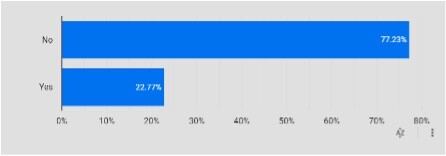
On the other hand, two Native American tribes are present in the state, which each command casinos that Texans can access. Given this, it makes more sense why so many Texans are in support of online gambling services being launched by tribal casinos. To back this idea up, 77.23% of participants agreed that any launch of online betting and gambling services should not ignore tribal casino rights.
Wrap-Up
One obvious conclusion to make is that regardless of state, most people seem to agree that the launches of online betting and gambling services should not ignore tribal rights, and this is a line of thinking that is present in states that feature tribal casinos and those that do not. However, differences begin to arise when considering the launch of online betting and gambling, if supported by tribal casino owners. Georgia seems to be the only state out of the five surveyed that agree with this notion. While Texas is close to a 50/50 split, the remaining state all do not like the idea of online gambling services that are supported by Native American tribes.
Gambling Consensus
This survey has been useful as it has allowed a greater insight into gambling behaviours, attitudes toward changing gambling laws in the US. There is no doubt that America is a minefield when it comes to navigating in which areas gambling is legal or illegal. However, this survey has been instrumental in shedding light on these issues, particularly within the five surveyed states. By sorting the data through the lens of demographical filters, more focused conclusions were able to be drawn.
By filtering the survey’s results by age, the attitudes of different generations were able to be revealed. While the consensus is normally that younger people enjoy gambling more, the survey has shown that this does not tell the whole story. In states such as Florida, it was older people who crossed state lines to gamble more than young people, showing that the desire to gamble is still present in older generations just as it is in more recent generations.
Looking at the survey through the gender demographic, it was easy to see that the typical gambling assumption that males enjoy gambling more and do so more frequently than females was true. The percentage of responses was largely in favour of males, showing that they regularly access gambling activities more. However, the survey also helped reveal some surprising findings on the gambling habits of women as it revealed that they gamble more than most might think. In states such as Florida and Ohio, they edged out the male response by more than half, indicating that females enjoy gambling too.
Examining the data through the scope of location was also useful as it helped reveal the surveyed states’ views on changing gambling laws. Four out of the five examined states are areas in which legislation is pending, so it would follow that most of these states would view changing gambling laws positively. This was not the case though, as it appears that only Texas and Georgia had held legislative change in a positive light. In the remaining states, there were high percentages of people who disagreed with playing at out of state casinos, which would indicate that the general feeling in those states towards legislative change is negative.
At first glance, one might suspect that the political alignment of a state might affect its views on changing gambling laws. This is what the data seemed to suggest originally following a developing pattern of red states being less in favour of gambling compared to blue states, which has the opposite view. Despite this, the findings from Texas highlighted that political alignment might not have a part to play as it broke the trend that was developing. On the other hand, data from Google Trends would suggest that blue states are indeed more in favour of legislative gambling change, but it is clear that more research is needed.
The survey also indicated that many of the five states were influenced by the changing gambling laws of the states around them. It is easy to see why this might be the case; neighbouring states who review their own gambling laws and elect to change them is something that is bound to spark discussions in surrounding states too. In addition to this, some states might be unwilling to lose money to bordering states if customers decide to cross state lines to gamble or access out of state casino options.
Without a doubt, issues of gambling legislation are rife throughout America and this presents a problem to iGaming players who are looking to get involved in the scene. The five surveyed states offer just a glimpse of the complexities that some states are facing when it comes to legalising gambling activities. As this takes place on a state-by-state basis, it is difficult to predict exactly what states will make the greatest amount of progress next. However, looking at the 2018 Supreme Court’s decision as well as the recent history of legislative gambling change in America, it is clear that the majority of the country is moving steadily towards outright gambling legalisation.
The data regarding the general view on tribal casino rights was also interesting, and most people thought that the launch of online betting and gambling supported by tribal casino owners was a bad thing which can be seen by the high percentages of respondents who said they wouldn’t support these launches. This finding was particularly interesting considering that this was a view that some people had in states where tribal casinos were already present. However, as most people seemed to agree that the launches of online betting and gambling services should not ignore tribal rights, the data suggests that people aren’t opposed to the idea of tribal casinos, more so the limitations this would have on online gambling options.
Conclusion
This report has allowed a better understanding of the current state of gambling in the US through the analysis of different demographic data, as well as other factors surrounding the topic of the US iGaming industry. By focussing on specific groups such as age and gender, the gambling habits of those groups and their attitudes towards changing gambling laws were able to be identified, which is always useful for players trying to get a grasp of their target audience. In addition to this, focusing on factors such as location, legislation status and tribal gambling rights has enabled a focused outlook on the state of US gambling holistically.
The data has illustrated that there is a clear desire for gambling, both through traditional and online methods, although this might be lower or higher depending on the state. Given the history of individual states and the US as a whole, it is likely that legislation will continue to be submitted in the hopes of changing gambling laws. Though this might be a slow process, it should be clear that many more states in America are heading towards legalisation.






